#cruiserracing – For the ordinary participant, sailing events just seem to happen. All they have to do personally is simply turn up, and get involved each year in a programme which somehow fits together both locally and nationally. But a lot of effort goes on behind the scenes to make events run smoothly, and innovative thinking has re-shaped the annual fixtures list. W M Nixon takes a look at the Irish Cruiser Racing Association, which in twelve short years has changed the face of our sport.
On Tuesday of this week, in an anonymous hotel room just about as far from sailing waters as it is possible to get in Ireland, the Executive Committee of one of the most effective national sailing bodies met for their key pre-season meeting to monitor the provision and development of the waterborne sport of hundreds of boats, and thousands of sailors.
As they're all busy folk giving of their time on a voluntary basis, the people who run the Irish Cruiser Racing Association approach their tasks with a minimum of fuss. Convenience and efficiency is all. And those who think that some of the most important decisions in Irish sailing are taken in sedate national headquarters, or in elegant committee rooms in stylish and historic yacht club premises, would find pause for thought in this hotel boardroom in Portlaoise.
There isn't so much as a picture on the wall to distract them from their deliberations as they progress down the agenda in businesslike manner. And as for taking a breather and maybe a refreshing walk along the waterfront at the nearest sailing location - as they'd say in New York, fuggedaboudid. Portlaoise is equidistant timewise from all the main sailing centres – hence its selection for meetings of a national committee - yet in our watery island, it almost uniquely manages to be more than an hour from the nearest sailing location.
That of course may change when the big new Dublin & Leinster Reservoir is constructed a few miles north, up by Mountmellick, for we're assured that it will include a recreational boating facility. But as it's a reservoir, the boats on it won't be those catered for by ICRA, which are boats with lids and loos. And as for the sport the Association provides, hotshot young dinghy sailors used to sniffily dismiss it as "truck-racing". But in the recessional years, you didn't hear that very often, for in the thin times ICRA's racing was sometimes the only show in town, and at its best it has been a very good show indeed.
The Association has been in being for a dozen years now, introduced at a ground-breaking meeting in 2002 in Kilkenny by the late Jim Donegan from Cork, Commodore of the South Coast Offshore Racing Association, and Fintan Cairns of Dun Laoghaire. To describe Fintan merely as a former Commodore of Dublin Bay Sailing Club scarcely gets the outline of the man. In his quiet way of much voluntary work in sailing, and in his continuing enthusiasm for personally going sailing whenever and wherever it's possible, and in whatever boat is available, he's inspirational.
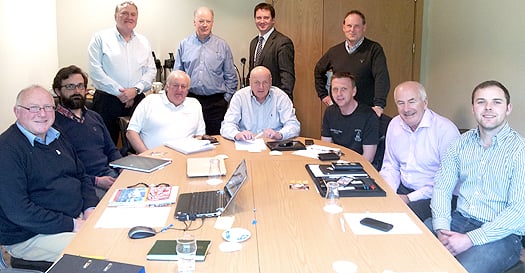
The ICRA Executive Committee meeting on Tuesday in Portlaoise includes (front row left to right); Denis Kiely (secretary ICRA), Cxema Pico (web and social media), Fintan Cairns (treasurer) Nobby Reilly (Commodore), Simon McGibney (WIORA), Barry Rose (Commodore's Cup Team Manager), and Brian Forde. Back row: Jack Roy (ISA Director), Ed Alcock (ISA Racing Manager), Ronan Enright (SCORA) and Peter Ryan (ISORA). Missing from photo is Technical Adviser Mark Mills, who'd been in attendance earlier but had to return to his Wicklow design office to complete the plans of another race winner.
Naturally there were those who wondered – this writer included – about the wisdom of trying to inaugurate a cruiser racing association based around a landmass, even when it's the Emerald Isle. Surely such racing is all about specific identification with sea areas such as the Irish Sea? But the Irish Sea Offshore Racing Association – at its height in the 1970s with its best annual entry in the season-long championship being 107 boats – was in rapid decline as lifestyles changed.
Those who in times past would have trundled off on a Thursday evening to sail maybe across channel to the start of an ISORA weekend event, and perhaps not return home until Sunday or even Monday, now found that modern expectations of inclusive family life precluded much of that. The contemporary mantra of "fun for all the family" simply cannot be applied to time-consuming offshore racing in the old-fashioned sense.
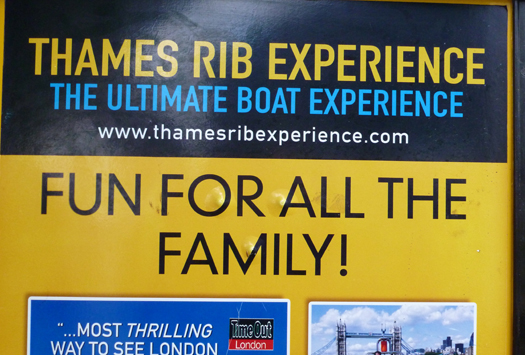
This sort of thing is all very well, but its popularity has signalled the death knell for traditional time-consuming family-unfriendly offshore racing. Photo: W M Nixon
Certainly you'll find family members who sail together on a cruiser-racer, but it's seldom as a complete family unit. So seldom, in fact, that when it occurs, it's a news item. And though quite often you will get a father and one or two sons sailing together, equally often you'll find the sons enjoy racing against the father if the old codger has managed to keep up with his sport, with no holds barred.
But in this age of conspicuous family togetherness, if cruiser-racing in anything other than in a club context in a few very local centres was going to prosper, it had to be in a format which was ultimately family-friendly, at the very least allowing whoever was the involved one – be it father, mother, son or daughter – to show the face with reasonable regularity when the rest of the family gathered.
Whether or not they do take the opportunity to be enthusiastic family members is something else altogether. What matters is that the new look to Irish offshore racing introduced the annual ICRA Nationals, held each year at a different venue, and rotating around the main centres in order to encourage those from other centres to make the voyage to the year's championship in anticipation that they would in turn be rewarded by having their club invited to host the Nationals the following year, or perhaps the year after that.
As for getting the boats to the selected venue, there might be a useful passage race – last year's Dun Laoghaire to Dingle conveniently brought boats to Tralee for the ICRA Nats 2013 – but delivery races aren't essential. The boat can be sailed to the venue by a small delivery crew, and then our marvellous new motorway system, which might have been developed with the needs of ICRA in mind, delivers the FVRO (Formerly Very Rich Owner), plus those crewmen in fulltime shore-based gainful employment, for a hectic extended weekend of racing which hopefully includes one extended coastal event in order to justify the moniker of Cruiser Racing.
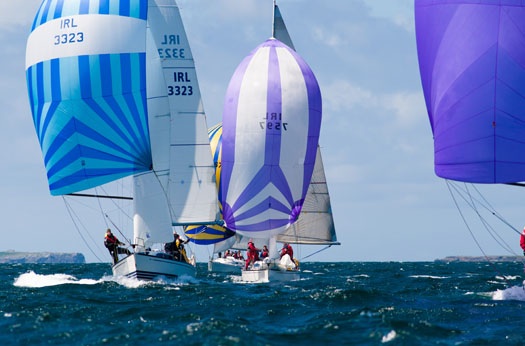
ICRA Nationals 2013 in Tralee Bay. When the sun shone, it was great. Photo: Robert Bateman
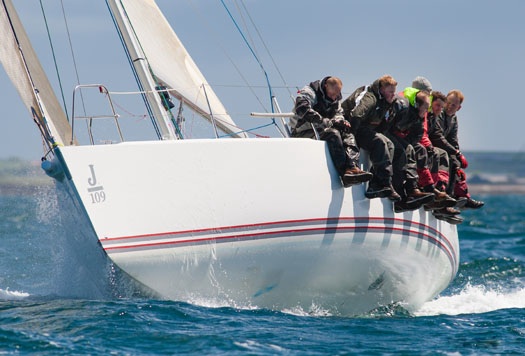
Not for the faint-hearted....the racing in Tralee Bay last year served up challenging sailing. Photo: Robert Bateman
It's not offshore racing as we used to know it, but it's what the people want, and it suits modern life. Although it may at times seem like no more than a glorified version of what any One Design keelboat class provides at its annual championship, the fact that each boat is racing to her own rating is not a drawback – it's part of the attraction. It means that in theory at least, any cruiser-racer sailed with reasonable competence is in with a chance. In fact, she and her crew are in with a double chance. Thanks to the number-crunching skills of ICRA's Denis Kiely, the backroom-boy par excellence, ICRA Championships are run with all boats under the the straight IRC rating, but also under the individual performance-related ECHO system.
It's the equivalent of having a two-strand golf major, with the usual open division, but also with people playing off handicap. Sporting purists might disdain it, but ICRA in their innate and growing wisdom know it's very important, and their double prize system reflects this.
However, the Association also aims at the clearest heights, and their work as organisers of the national team for the Commodore's Cup was crowned with the success of the outright win for Ireland in 2010, with ICRA Commodore Barry Rose of Cork in the driving seat of an outstanding campaign. That the Association's ethos is based on steady work without fuss was underlined by their reaction to becoming the Mitsubishi Motors "Club of the Year" for 2011 as a direct result. Sometimes when a club gets this award, it's received with a sense of entitlement. But in the case of ICRA, their delighted surprise was genuine, and they showed it by the entire management team turning up for the award ceremony.
Yet while the heights of the international offshore scene are within ICRA's remit, equally the Association's officers are involved with making the sport seem more accessible. I've long since given up being concerned by being told that there is a public perception of sailing as being exclusive and elitist. So what if it is? After all, any sport is competitive. And where you get competition, you eventually have winners. To get winners, you need selection. And one person's selection is another person's exclusion. Thus anyone selected seems part of an elite to those who aren't.
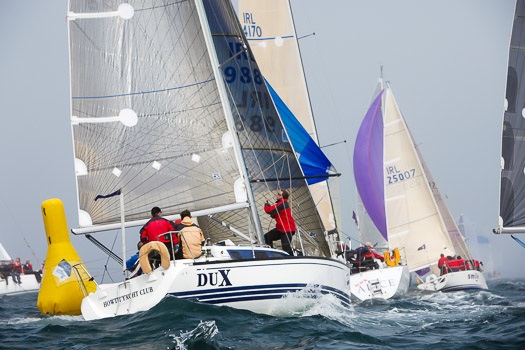
Classic ICRA racing at the Nationals in the Irish Sea, with seasoned campaigner Anthony Gore-Grimes' X 310 Dux on the way to another success. Photo: Robert Bateman
In sailing, it's something which is emphasised by the demands of campaigning a cruiser-racer. Running a successful boat-with-a-lid is like running a very intense small business. In addition to the management of the boat and equipment, you have the continuous personnel administrative demands of selecting and recruiting an effective crew, people who'll work as a team yet have individual talents which can be harnessed for the greater good. And they'll also need to contribute to the inter-personal harmony on board, often in conditions of acute physical discomfort.
To be a useful element in this, it's every bit as important to think about what you might bring to the party. Anyone who needs to be mollycoddled into a crew and is hyper-sensitive about exclusivity or elitism or whatever, is unlikely to make the grade. And it certainly won't be a gentle democracy on board, but equally an insensitive dictatorship won't work either. It's a group with a consultative leader in a continuous state of dynamic development in continually changing situations.
At the end of the race or the series, it may well be that you and your shipmates will be only too glad to see the back of each other. But then again, the shared experience, and the delight of sailing the sea when the going is good and the right judgements have been made, can be so rewarding that naturally a huge camaraderie will develop. And that of course will seem exclusive and elitist to those who haven't been part of it.
But believe me, offshore racing skippers are cunning devils, and they're always on the lookout for new crew material in all sorts of unusual ways. It is indeed like the innovative management of a successful business. A case in point was the great Denis Doyle of Cork with his remarkable partnership with the 51ft Moonduster for 20 years from 1981 onwards. In his earlier offshore racing days, Denis had been of the generation which expected the owner to be the helmsman. But by the time Moonduster came along, he'd learned to delegate - he knew that others could be better on the wheel. And in his first years with the boat, he was successfully crewed by all the top young offshore sailors and dinghy helmsmen of Crosshaven.
But gradually they moved on to boats of their own, and by the 1990s there were more boats than crews to go round. So Denis thought afresh, and made Moonduster berths available to cadets from the Naval Base up Cork Harbour at Haulbowline. But it was a case of a little learning being a dangerous thing. What the naval cadets already knew about ship handling from their professional training as sailors actually got in the way of crewing a sailing racer. So the bould Denis linked up with Commandant Barney Goulding of the Irish Army, and invited him to bring army trainees along. They were enthusiastic, but they didn't have any pre-conceived notion of what sailing involved, yet were mustard keen to learn. It worked a treat.
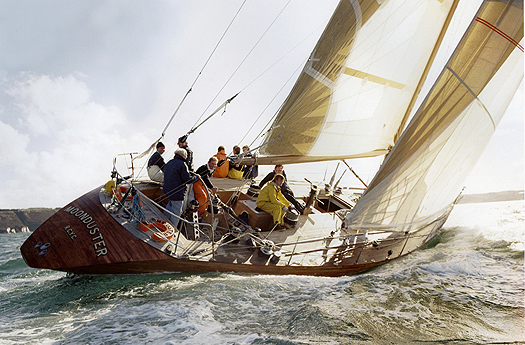
Moonduster in her element with owner Denis Doyle (unusually) at the helm. Photo: Robert Bateman
But things have moved on, and recruiting for cruiser-racer crews now has to operate in the open market. Knowing this, ICRA Commodore Nobby Reilly of Howth is organising a Come Sailing Day at his home club on Saturday May 3rd using the flotilla of SailFleet J/80s. This attracted more than 80 interested newcomers last year, they've honed the programme to make it even more user-friendly this year, and as a bonus, three selected (that word again) talents emerging from the day's activities will be invited to join the crew of a Volvo 70 which David Ryan has chartered for this year's Round Ireland Race on June 28th.
Nobby Reilly himself knows a thing or two about the wily ways of crew recruiters from his own long offshore racing career. These days he campaigns the Mills 36 Crazy Horse in partnership with Alan Chambers, and as the Gareth Craig photo shows in all its untrimmed glory here, they really do get stuck in. It may not be quite as spectacular as the mining operation mounted in a fierce squall by Gordon Maguire while running up the Solent some years ago in Cowes Week at the helm of the BH 41 Silk owned by Jocelyn Waller of Lough Derg YC - the word is that Silk's stem hit the seabed before she lifted her head again. But it was quite exciting at the time for Crazy Horse's crew, some of whom are very senior sailors whose association with Nobby goes back to the days when he and his brother Paddy were campaigning the big Humphreys 43 Comanche Raider, a boat which definitely needed a large ship's complement of all the talents, recruited just wherever they could be found.
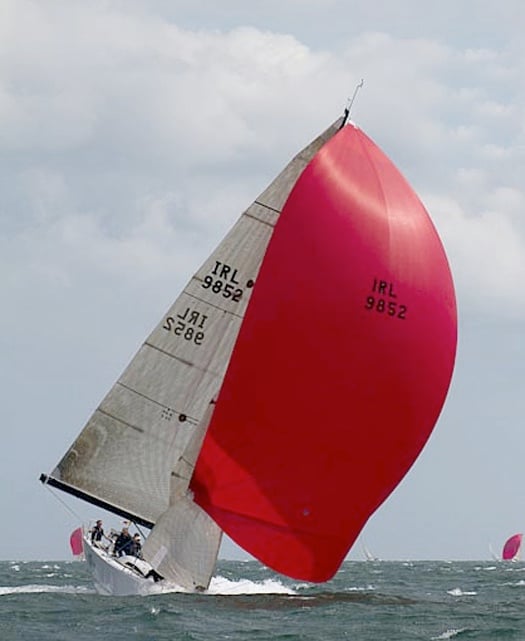
In all her glory. A little bit of sport for Crazy Horse and her crew, some of whom have been sailing with current ICRA Commodore Nobby Reilly for very many years. Photo: Gareth Craig
Next up on the programme after the Come Sailing Day is the ICRA Nationals on Dublin Bay, run from June 13th to 15th in conjunction with the Royal Irish YC. Fleet numbers are already pushing towards a satisfactory level at the hundred-plus mark, but inevitably there will be an East Coast emphasis as there's a biennial Cork Week this year in July.
Time was when the keenest boats and crews would happily take in the Scottish Series, the ICRA Nationals, the Round Ireland Race, Cork Week and the West Cork Regattas, all in one season. But times are changing. We're still recovering from an economic recession which clipped all wings. But there are signs in any case that amateur sailors increasingly prefer to put all their campaigning effort into one big chosen event, and make do with a selection of smaller local series for the rest of the season.
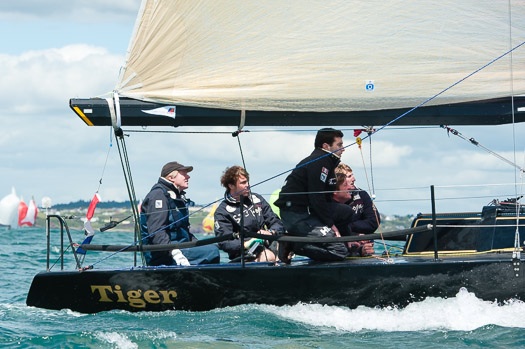
The Kenefick family's front rank Quarter Tonner Tiger from Cork will be racing ICRA Week 2014 in Dun Laoghaire as Nathan Kirwan Trust in a fund-raising campaign. Photo: Robert Bateman
It's those family demands again, something which is now so dominant that anyone of the webbed-foot tendency who expects to sail flat out from one end of the season to the other is regarded as a bit odd. So a viewpoint put forward by Afloat.ie's Water Rat about the need to rationalise the events programme even further is worthy of consideration. But for now the 2014 programme is under way, and it will be instructive to see how it develops, and how the ICRA Executive reacts.
For in addition to many members being involved in the Round Ireland at the end of June, three weeks later the 2014 Commodore's Cup is being staged at Cowes from July 19th to 26th, and Ireland is very much back in the fray after deferring to economic force majeur in 2012, when they didn't mount a defence of their 2010 victory.
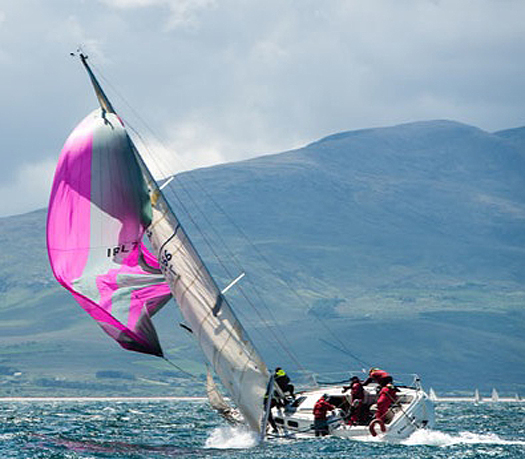
It's Kerry – big mountains, big winds, and all the sport of the ICRA Nationals 2013 at Tralee Bay SC. Photo: Robert Bateman
But at the same time the WIORA Championship is being staged on Clew Bay by Mayo YC. Clew Bay is just about as far as you can get if sailing there from the main sailing centres – once you've passed it, you're heading for home. So there was a plan to take the J/80s there and have clubs send representative crews to race them within the WIORA format. But there's just too much going on, time was against getting it all together for this formidable logistical challenge, so ICRA's man in the west Simon McGibney is concentrating on having the J/80s as a featured part of WIORA Week 2015 in Galway.
Meanwhile, the cruiser-racer and offshore season for 2014 is upon us. ICRA is once again balancing up on the tight-rope, laying on the welcome for newcomers while keeping seasoned campaigners on side. There's no other organisation in Irish sailing life which can think on its feet with the same speed and agility. And the contribution to our sport by the small voluntary staff running this big-hearted operation is a wonder to behold.
































































